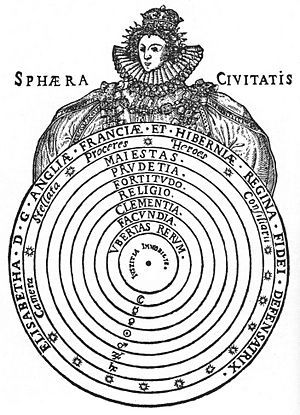John Case (Aristotelian writer) facts for kids
John Case (also known as Johannes Casus) was an English writer and thinker who lived a long time ago, in the 1500s. He was famous for writing books that explained the ideas of Aristotle, a very important ancient Greek philosopher.
Life of John Case
John Case was born in a town called Woodstock, Oxfordshire, sometime between 1539 and 1546. When he was young, he sang in choirs at New College and Christ Church, Oxford in Oxford.
In 1564, he earned a scholarship to study at St. John's College. He earned his first degree (B.A.) in 1568 and a master's degree (M.A.) in 1572. He became a fellow at his college, which meant he was a senior member and teacher. John Case was known for being very good at debating and discussing ideas.
In 1574, he left his position at the college because he was a Roman Catholic. He then married Elizabeth Dobson.
Case was given permission by the university to teach logic and philosophy. He taught young people, many of whom were Roman Catholics, in his own home in Oxford. His classes became very popular because he was known as an excellent teacher of logic and debate. One of his students was Edward Weston.
John Case wrote many handbooks for his students. These books were published and became quite popular for a while. People described him as a kind, religious, and hardworking person. He was also a great conversationalist and a very enthusiastic teacher. His students really liked him. Besides philosophy, he was also an expert in music and became a respected doctor, earning his medical degree (M.D.) in 1589.
Case earned a good amount of money from his medical practice. He left money to St. John's College, New College, and to the poor people of Woodstock. In 1589, he became a Canon at Salisbury Cathedral. He passed away on January 23, 1600, and was buried in the chapel of St. John's College. You can see his portrait at the Bodleian Library in Oxford.
John Case's Writings
Most of John Case's books were commentaries. This means they were detailed explanations of the writings of Aristotle. He wrote about Aristotle's books on logic (called the Organon), ethics (how to live a good life, like the Nicomachean Ethics), politics (how societies are governed, like the Politics), economics (how households are managed, like the Economics), and physics (the study of nature, like the Physics). His books had interesting titles and were very widely read during his time. They were often printed again and again.
Some of his important works include:
- Summa veterum interpretum in universam dialecticam Aristotelis (1584): This book was about Aristotle's ideas on logic.
- Speculum moralium quaestionium in universam ethicen Aristotelis (1585): This was a commentary on Aristotle's Nicomachean Ethics, which discusses how to live a moral life. It was the very first book printed at the Oxford University press, which was given to the university by their leader, Robert Dudley, 1st Earl of Leicester. This book was so popular that it was reprinted eight times in Germany by 1625.
- Sphaera Civitatis (1588): This book explained Aristotle's Politics, which is about how cities and governments work. Like his other books, it was reprinted in other countries. The printer, Barnes, even got an order from the university in 1590 that every student getting a bachelor's degree had to buy a copy!
Case's later works included:
- Reflexus Speculi Moralis (1596): Another book explaining Aristotle's moral philosophy.
- Thesaurus Oeconomiae (1597): A commentary on a book about economics that was thought to be by Aristotle.
- Lapis philosophicus seu commentarius in VIII libros Physicorum Arisotelis (1599): This book was about Aristotle's Physics, which explores the natural world. Even though its title sounds like it's about alchemy (trying to turn metals into gold), it wasn't.
- Ancilla Philosophiae (1599): A shorter summary of Aristotle's Physics.
John Case also wrote about music. He wrote Apologia Musices, tam vocalis quam instrumentalis et mixtae (1588), which is a defense of music, both singing and playing instruments. There is a copy of this book in the Lambeth Library. Another book, The Praise of Musicke (1586), is also believed to be by him. This book talks about the proper use of music in church. The printer dedicated it to Sir Walter Raleigh, calling it "an orphan of one of Lady Musicke's children," meaning it was a book about music without a clear author. A poet named Thomas Watson even wrote a poem praising John Case for his book on music.
There are also three letters written by John Case that are kept in the British Library. He also wrote an introduction letter for a book by Nicholas Breton called Pilgrimage to Paradise.
 | Victor J. Glover |
 | Yvonne Cagle |
 | Jeanette Epps |
 | Bernard A. Harris Jr. |


